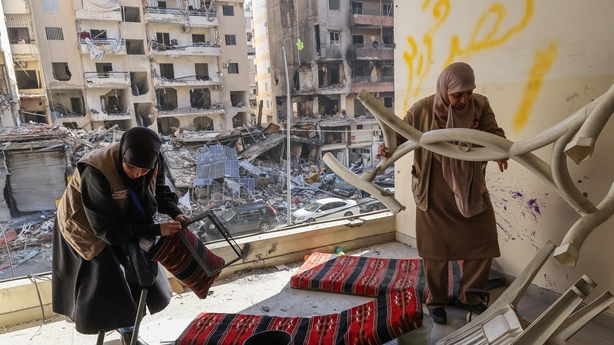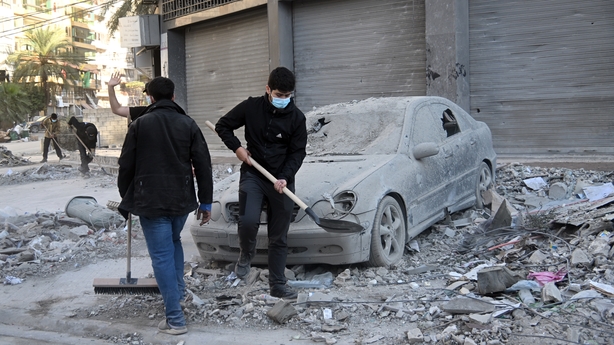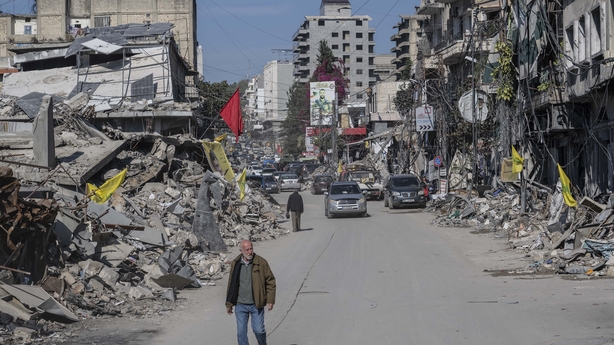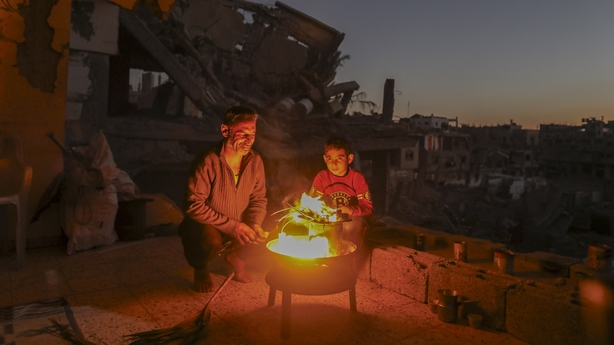Lebanon's health ministry has said an Israeli drone strike on a southern town has killed one person, amid a fragile truce between Israel and Iran-backed militant group Hezbollah.
Yesterday, Israeli strikes on south Lebanon killed 11 people, according to updated ministry figures, the deadliest raids since the ceasefire took effect last Wednesday.
Both sides have accused the other of repeated violations.
"An Israeli enemy drone strike on the town of Shebaa killed one person," a health ministry statement said.
The state-run National News Agency (NNA) described the dead man as a "shepherd".
We need your consent to load this rte-player contentWe use rte-player to manage extra content that can set cookies on your device and collect data about your activity. Please review their details and accept them to load the content.Manage Preferences
The ministry said yesterday's strikes killed six people in the village of Haris, four in Tallousa and one in Jdeidet Marjayoun.
The Israeli military said it "struck Hezbollah terrorists, dozens of launchers, and terrorist infrastructure throughout Lebanon", after Hezbollah earlier in the day claimed its first attack on an Israeli position since the truce took effect.
Earlier, Israeli Defence Minister Israel Katz warned that if the ceasefire collapsed, Israel would penetrate deeper into Lebanon and would no longer differentiate between the Lebanese army and Hezbollah.
He said: "If we return to war, we will act with greater force and penetrate deeper and... there will be no immunity for the state of Lebanon," he said during a tour of Israel's northern border.
"Until now, we made a distinction between Lebanon and Hezbollah... it will no longer be the case."

Earlier, Hezbollah said it had launched an attack targeting an Israeli position in "the occupied hills of Kfar Shouba", in a disputed part of the border area between Israel and Lebanon.
Israel's military said Hezbollah had launched two projectiles towards one of its posts in the area of Har Dov, Israel's term for the disputed Shebaa Farms.
After that attack, Israeli Prime Minister Benjamin Netanyahu accused Hezbollah of a "serious violation" and vowed to "respond forcefully".
"We are determined to uphold the ceasefire and respond to any violation by Hezbollah, no matter how minor or serious," he said.
'Aggressive actions'
Israel has carried out a near-daily series of strikes in southern Lebanon since the ceasefire was put in place, and earlier yesterday Beirut's powerful parliament speaker Nabih Berri accused it of violating the truce.

"The aggressive actions carried out by Israeli occupation forces... represent a flagrant violation of the terms of the ceasefire agreement," said Mr Berri, who helped mediate the truce on behalf of ally Hezbollah.
The fighting escalated after Israel moved its focus from Gaza to Lebanon in September to secure its northern border from Hezbollah attacks, dealing the Iran-backed Shiite Muslim movement a series of stunning blows.
We need your consent to load this rte-player contentWe use rte-player to manage extra content that can set cookies on your device and collect data about your activity. Please review their details and accept them to load the content.Manage Preferences
Also yesterday, French Foreign Minister Jean-Noel Barrot told Israeli Foreign Minister Gideon Saar in a call of "the need for all sides to respect the ceasefire in Lebanon", the foreign ministry said.
Mr Saar rejected accusations that Israel had violated the truce, claiming instead that his country's strikes were "enforcing" the ceasefire.
He also said Hezbollah had attempted to move weapons in southern Lebanon and their presence "south of the Litani river is the most basic violation of the understandings".
Under the deal, Hezbollah must withdraw its fighters from areas south of the river, and dismantle its military infrastructure in the south.

As part of the agreement, the Lebanese army and United Nations peacekeepers will deploy in southern Lebanon as the Israeli army withdraws over a period of 60 days.
Israel urged to 'stop its violations' of ceasefire
A committee involving France, UN peacekeepers, Israel, Lebanon and chaired by the United States is tasked with maintaining communication between the various parties and ensuring violations are identified and dealt with to avoid any escalation.
"We ask the technical committee formed to monitor the implementation of this agreement where it stands on ongoing violations... that have exceeded 54 breaches," Mr Berri added, urging it to "oblige Israel to stop its violations and withdraw from territories it occupies".
The US said it believed that a ceasefire was still holding in Lebanon and that it was looking at potential violations.

Meanwhile, Palestinian Islamist movement Hamas and Palestinian president Mahmud Abbas's Fatah party have agreed to create a committee to jointly run post-war Gaza, negotiators from both sides said.
Under the plan, which needs Mr Abbas's approval, the committee would be composed of ten to 15 non-partisan figures with authority on matters related to the economy, education, health, humanitarian aid and reconstruction, according to a draft of the proposal.
Following talks in Cairo brokered by Egypt, the two rival factions agreed the committee would administer the Palestinian side of the Rafah checkpoint on the border with Egypt - the territory's only crossing not shared with Israel.
Fatah's delegation would return later to Ramallah to seek Mr Abbas's final approval, negotiators from both sides said.
The initiative comes at a time of renewed diplomatic efforts to end the war.

